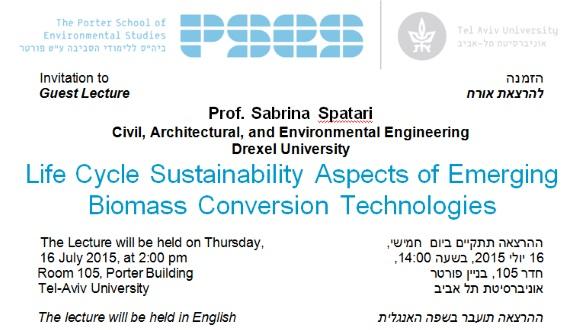הרצאת אורחת - Prof. Sabrina Spatari
היבטים של מחזור חיים מקיים של טכנולוגיות מתפתחות להמרת ביומסה
Life Cycle Sustainability Aspects of Emerging Biomass Conversion Technologies
ההרצאה תתקיים באנגלית
Abstract
There has been much interest in developing domestic alternatives to petroleum-based transportation fuels in recent years due to volatile petroleum prices, geo-political challenges, the carbon intensity of fossil energy supply, and the economic benefits of expanding domestic energy markets. Biofuels are a promising option for transportation because of their ease of blending with fossil fuels in the interim, their compatibility with the existing fuel infrastructure, and that there are few alternatives to liquid storage of energy for long haul transportation. In view of these advantages and to address global climate change, energy security, and other sustainability goals, countries around the world including the U.S. and the UK have developed policies to incentivize biofuels into the market. North American policy instruments include the federal Renewable Fuel Standard (RFS2) and state-level policies such as California’s Low Carbon Fuel Standard (LCFS). At present biological and thermochemical technologies are under development at laboratory, pilot scale, and in some cases at a demonstration stage to investigate the technological needs of scaling biofuels. Ethanol, higher alcohols, and fully infrastructure compatible fuels (with 0% oxygen – physically and chemically similar to current petroleum based fuels) are being developed at different scales, including farm scale (up to 200 dry metric tons/day) and industrial scale (2000 dry metric tons/day and higher) to utilize diverse lignocellulosic sources. Life cycle assessment (LCA) is a method for evaluating the environmental performance of biofuels emerging through R&D, and a necessary tool for developing and judging the compliance of those biofuels under state and federal policy standards. This presentation investigates technological, environmental, and energy and resource impacts of a set of emerging lignocellulose-based biofuels from biological and thermochemical technologies at different scales using statistically based LCA methods. Uncertainties that stem from technological performance in the near and medium terms are characterized. This presentation will further highlight how analytical models for understanding the full set of environmental tradeoffs associated with emerging fuel technologies are essential inputs to guiding policy and commercial enterprise decision making for improving the overall sustainability of transportation energy.


